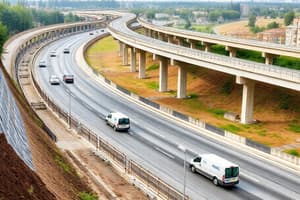Podcast
Questions and Answers
What is the maximum design speed for a freeway?
What is the maximum design speed for a freeway?
- 120 kilometers per hour (correct)
- 150 kilometers per hour
- 100 kilometers per hour
- 80 kilometers per hour
What is a key characteristic of an expressway?
What is a key characteristic of an expressway?
- Unlimited parking along the roadside
- Traffic signals at every intersection
- Grade separation and controlled access (correct)
- Maximum speed of 50 kilometers per hour
What is the design speed range for arterial roads?
What is the design speed range for arterial roads?
- 100 to 120 kilometers per hour
- 30 to 50 kilometers per hour
- 15 to 30 kilometers per hour
- 80 to 100 kilometers per hour (correct)
Which type of road features physically separated carriageways for different traffic streams?
Which type of road features physically separated carriageways for different traffic streams?
What is one defining feature of a collector/minor road?
What is one defining feature of a collector/minor road?
What is the maximum design speed for local roads?
What is the maximum design speed for local roads?
Which statement accurately describes the access and usage for freeways?
Which statement accurately describes the access and usage for freeways?
What design characteristic defines boulevards?
What design characteristic defines boulevards?
What defines a highway?
What defines a highway?
Which historical figure is credited with introducing a new concept in road construction?
Which historical figure is credited with introducing a new concept in road construction?
What construction material was significantly utilized by the Romans in road building?
What construction material was significantly utilized by the Romans in road building?
Which layer in ancient road construction consisted of the thick layer of concrete made from stone?
Which layer in ancient road construction consisted of the thick layer of concrete made from stone?
What was the primary purpose of early roads constructed around 3500 BC?
What was the primary purpose of early roads constructed around 3500 BC?
Which series of actions occurred in the Philippines post World War II regarding highways?
Which series of actions occurred in the Philippines post World War II regarding highways?
What was one of the early materials used for road construction before the introduction of cement?
What was one of the early materials used for road construction before the introduction of cement?
Which engineer is known for developing the macadam road construction method?
Which engineer is known for developing the macadam road construction method?
Flashcards are hidden until you start studying
Study Notes
Definition and Purpose of Highways
- Major roads designed for high-speed, efficient vehicle movement over long distances.
- Typically feature multiple lanes to accommodate large traffic volumes.
- Connect cities, towns, and regions, facilitating both local and interstate travel.
Historical Context
- Early roads (circa 3500 BC) were built for military movement and trade.
- Romans innovated with cement, constructing roads that lasted for 2000 years.
Construction Techniques in History
- Summum Dursum: Large stone slabs used in early roads.
- Nucleus: Layer made from small gravel and coarse sand.
- Rudus: Thick layer of concrete made from stone.
- Statumen: Layer of stones, each at least 2 inches in size.
Pioneers of Road Development
- Jerome Tresaguet: Introduced modern road building techniques; known as the father of modern road construction.
- Thomas Telford: Notable Scottish engineer; contributed significantly to road design.
- John Loudon McAdam: Developed the macadam road, leading to widespread acceptance in construction.
- Eli Blake: Invented the first stone crusher in 1858, enhancing road material processing.
Highway Development in the Philippines
- Pre-1900s: No formal highways; transport relied on trails and waterways.
- Post World War II: Emphasis on road development aided by Japanese and US financial support.
- 20 Years After WWII: Major highways and expressways constructed with World Bank and IMF assistance.
- 1950s-1980s: Road construction prioritized during the automobile age with the slogan "The nation is on wheels."
- 1980s to Present: Continued development along with technical advancements in highway construction.
Common Functional Categories of Highways
- Freeway: Designed for high-speed motor vehicles with speed limits of 120 km/h or more; features complete or partial separation from other roads.
- Expressway: Handles high-speed traffic (≥100 km/h) with controlled access and no parking; interchanged distances based on specific formulas.
- Arterial Road: Supports traffic mobility for various transportation means; maximum speed between 80-100 km/h.
- Boulevard: Separate roadways for different traffic streams with controlled intersections; maximum speed between 70-80 km/h.
- Collector/Minor Roads: Allows for vehicle and pedestrian traffic with designated parking; speed limit of 30-50 km/h.
- Local Road: Single travel way catering to all vehicles with unlimited parking; maximum speed of 15 km/h.
Studying That Suits You
Use AI to generate personalized quizzes and flashcards to suit your learning preferences.



